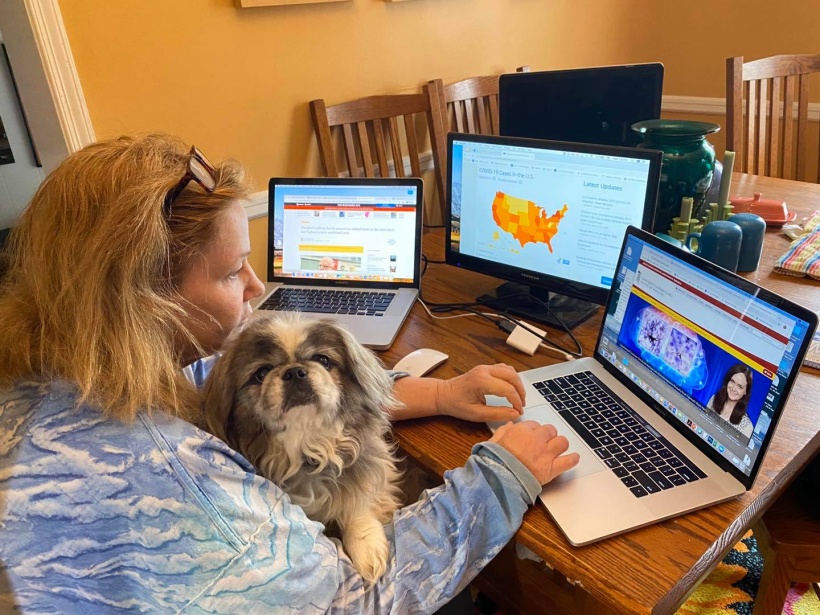Telework-Life Balance Comes Into Focus
Undoubtedly by the end of this year, someone will publish a book on the seven stages of telework grief during a pandemic.

Joanne Morrison, director of marketing and public relations for the University of Maryland School of Medicine, teleworks with her dog, Ben.
The shock, anger, and bargaining with technology and new workflows has been assuaged by the positive support University of Maryland, Baltimore (UMB) faculty and employees have expressed to each other during an online brown bag lunch series. These Webex sessions are hosted by UMB Human Resource Services’ (HRS) Organization and Employee Development (OED).
While employees recognized challenges, there was an underlying positive tone to overcoming new barriers.
“I’ve had conversations with folks on campus about that we have to forgive ourselves for not being as productive as perhaps we would like,” said Mark Emmel, MAS, SPHR, director of OED, during an April 23 Establishing Virtual Teams training. “I think we need to acknowledge that in others.”
Yes: It is OK to take care of your family and step away from the home office during a pandemic.
And maybe it’s a good idea to scale back the requests for video meetings.
“In HR, we were like Webex’d out,” Emmel told the approximately 50 online attendees. “I would say to a couple of my fellow directors: ‘Haven’t we talked about this, this week, or have I totally lost my mind?’”
The OED sessions are a blend of an emotional and technical help desk of sorts. Employees traded tips on managing stress, technology barriers, and projects on top of everything else happening at home.
The key is that there is not one solution that will work for everyone.
“I think the biggest challenge for managers is that ‘one size does not fit all,’” Emmel said. “Some people need more face time and interaction than others. I recommend having a sincere conversation with your manager or direct reports about what is working or not working.”
The remaining sessions this semester include Planning an Effective Performance Appraisal at noon on Wednesday; Gaining a Positive Perspective on Feedback at noon on May 7, and a second employee telework support forum that is scheduled for noon on May 27.
Senior OED consultant Nicole Palmore, MSW, said that she hopes teleworking can foster a better sense of connection during the pandemic as we’re now inside each other’s homes.
“You are seeing your colleagues now as a full person,” Palmore said. “For the first time, you’re seeing a glimpse into someone’s home. You’re getting a glimpse into someone’s children. Hopefully, this carries to when we do go back to campus that we see each other as more than just a colleague but as a full person.”
Some employees are not seen at all because they are on paid administrative leave during the pandemic. One UMB community member asked: Would a call to check in on them be appropriate?
“My initial gut reaction — this is not policy or anything — is absolutely,” Emmel said. “I think it’s really important to help those folks stay engaged whenever possible. It’s not their fault they can’t telework, and it’s not like they’re on FMLA where you’re not supposed to contact them when they’re sick.”
Emmel added that it would be a good idea to keep the occasional conversations light with those employees.
“Not so much about work, but sort of check in with them emotionally and see how they’re doing with all of that, and let them ask questions,” he said.
Wellness and work life manager Jina Bacchus heard that some employees may feel bored during their personal time. One tip is to find a new home-based hobby. Even Bacchus, who is raising a 4-year-old son, had the chance to learn something new.
“I picked up playing ukulele,” she said in a Zoom interview. “I know some basics for guitar. I received a ukulele as a gift.”
The Employee Assistance Program, which offers support and coping resources, is available at UMB for those folks experiencing difficulties. Bacchus said the HRS staff is available to help UMB employees feel more at ease.
“I don’t want them to feel alone. It’s a cliché that ‘we’re in this together,’ but it’s so true. UMB has pulled together,” Bacchus said.
Additional training resources are available on The Learning Hub at umb.sumtotal.host.
Here are some tips offered by HRS staff and others from the sessions:
- Have a sincere conversation with your manager/direct reports about what is working/not working.
- Be patient with others as we balance family, technology challenges, and health.
- Connect with employees on a human level. Ask about their kids, pets, families.
- Establish expectations for whether video should be on or off for meetings.
- Working from home doesn’t mean you can’t take time off. Request paid leave if available to take care of yourself or your family.
- Schedule video calls for on the hour and at a maximum 45 minutes with a hard stop to give people 15 minutes to take a break between their next call. Or, start calls 15 minutes after the hour.
- Have themes for team meetings to keep things light such as “crazy hats” or “furry friends.”
- Block off a day to be Webex-free to work on writing and reading documents.
- Take walks during conference calls to stay active.
- Be forgiving of yourself and others for family demands and technology limitations.
- Adjust your standards and schedule to accommodate your family.
- Consider adjusting the frequency of one-on-one or staff meetings to weekly but shorten the length.
- Ask a colleague, “Pretend I’m popping in your office when I call you on the phone.”
- Complex feedback should be done over the phone or video.
- In lieu of asking for a daily work log, ask for status or general updates on projects.



